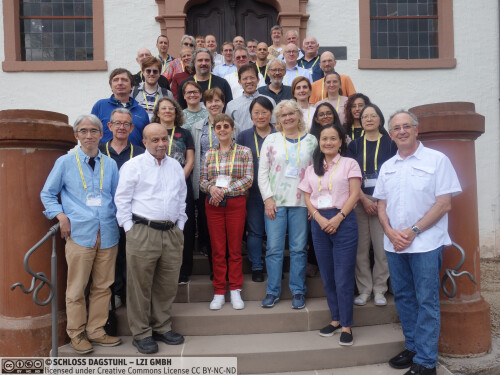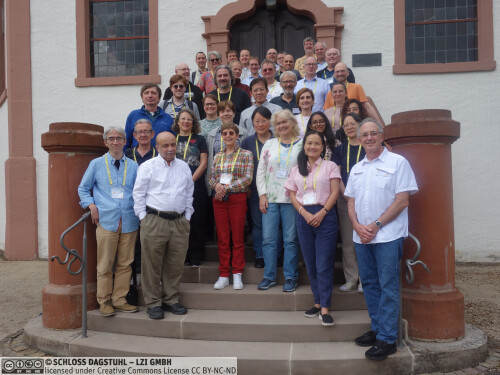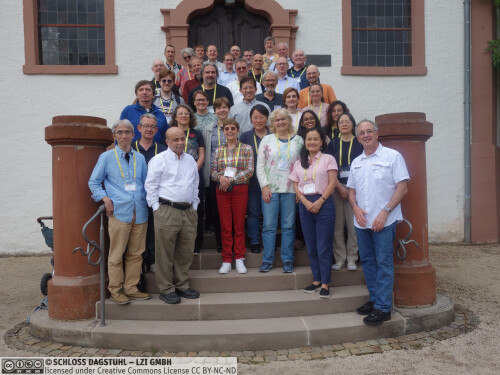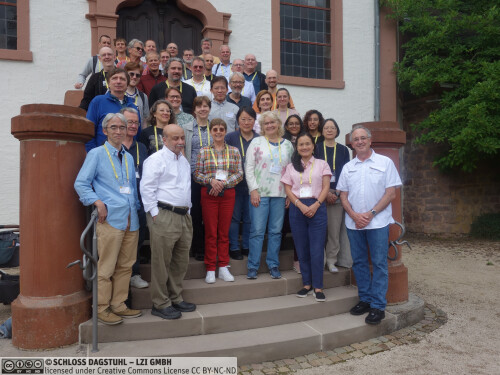Dagstuhl Seminar 25281
From Sparse Interpolation to Signal Processing: New Synergies
( Jul 06 – Jul 11, 2025 )
Permalink
Organizers
- Annie Cuyt (University of Antwerp, BE)
- Dirk de Villiers (Stellenbosch University, ZA)
- Wen-shin Lee (University of Stirling, GB)
- Ana C. Matos (Lille I University, FR)
- Gerlind Plonka-Hoch (Universität Göttingen, DE)
Contact
- Andreas Dolzmann (for scientific matters)
- Jutka Gasiorowski (for administrative matters)
Shared Documents
- Dagstuhl Materials Page (Use personal credentials as created in DOOR to log in)
In a digital world overwhelmed by data, the problem of finding sparse model representations, using a minimum number of probes, such as in multi-exponential models, has become a priority. The acquisition of signal or image measurements may also be very expensive and therefore limited. In many applications, measurement sets are huge but contaminated by noise. Investigating novel exponential analysis techniques and understanding any limiting difficulties in important applications will be crucial for cutting edge developments and breakthroughs.
Multi-exponential analysis might sound remote, but it touches our daily lives in many surprising ways, even if most people are unaware of how important it is. For example, a substantial amount of effort in signal processing and time series analysis is essentially dedicated to the analysis of multi-exponential functions with complex exponents. As for multi-exponential functions with real exponents, they are used to portray relaxation, chemical reactions, radioactivity, heat transfer, and fluid dynamics.
The problem statement is closely related to different topics in the computational sciences: the connections with structured matrix theory, rational approximation theory, sparse interpolation, scale-and-shift techniques, tensor decomposition, non-convex optimisation, subdivision methods, spherical harmonics deserve further exploration and may lead to improved numerical algorithms.
Multi-exponential analysis is also fundamental to several application domains in engineering and industry: direction-of-arrival (DOA) estimation, remote sensing, antenna design, digital imaging, super-resolution, testing and metrology, radio astronomy, magnetic resonance imaging (MRI), seismology, all impacting some major societal challenges such as energy, transportation, space research, health and telecommunications.
This Dagstuhl Seminar aims to connect stakeholders from all these fields: computational harmonic analysis, numerical linear algebra, computer algebra, nonlinear approximation theory, digital signal processing and their applications. We hope to bring about more cross-fertilization between the different and separately developed subdomains linked to the seminar theme.
 Annie Cuyt, Dirk de Villiers, Wen-shin Lee, Ana C. Matos, and Gerlind Plonka-Hoch
Annie Cuyt, Dirk de Villiers, Wen-shin Lee, Ana C. Matos, and Gerlind Plonka-Hoch
Please log in to DOOR to see more details.
- Bernhard Beckermann (University of Lille, FR) [dblp]
- Robert Beinert (TU Berlin, DE)
- Andreas Beutler (Mahr - Göttingen, DE)
- Mariantonia Cotronei (University Mediterranea of Reggio Calabria, IT) [dblp]
- Annie Cuyt (University of Antwerp, BE) [dblp]
- David Davidson (Curtin University - Bentley, AU)
- Dirk de Villiers (Stellenbosch University, ZA) [dblp]
- Nuha Diab (Tel Aviv University, IL) [dblp]
- Jürgen Gerhard (Maplesoft - Waterloo, CA) [dblp]
- Johan Gielis (Genicap - Tilburg, NL) [dblp]
- Mark Giesbrecht (University of Waterloo, CA) [dblp]
- Jacki Gilmore (Stellenbosch University, ZA)
- Pascal Giorgi (University of Montpellier & CNRS, FR) [dblp]
- Bruno Grenet (University of Grenoble, FR) [dblp]
- Mariya Ishteva (KU Leuven - Geel, BE) [dblp]
- Armin Iske (Universität Hamburg, DE) [dblp]
- George Labahn (University of Waterloo, CA) [dblp]
- Wen-shin Lee (University of Stirling, GB) [dblp]
- David Li (The University of Strathclyde - Glasgow, GB) [dblp]
- Hao Liang (Chinese Academy of Sciences - Beijing, CN)
- Ana C. Matos (Lille I University, FR) [dblp]
- Hrushikesh N. Mhaskar (Claremont Graduate University, US) [dblp]
- Hans Michael Möller (TU Dortmund, DE)
- Ryan O'Dowd (Claremont Graduate University, US)
- Anthony O'Hare (University of Stirling, GB) [dblp]
- Miao-Jung Yvonne Ou (University of Delaware, US) [dblp]
- Teresa E. Pérez (University of Granada, ES)
- Miguel Piñar (University of Granada, ES) [dblp]
- Petr Plechac (University of Delaware, US)
- Gerlind Plonka-Hoch (Universität Göttingen, DE) [dblp]
- Daniel Potts (TU Chemnitz, DE) [dblp]
- Jürgen Prestin (Universität zu Lübeck, DE) [dblp]
- Michele Pugno (University of Antwerp, BE)
- Daniel Roche (U.S. Naval Academy - Annapolis, US) [dblp]
- Tomas Sauer (Universität Passau, DE) [dblp]
- Yehonatan-Itay Segman (Technion - Haifa, IL)
- Ramonika Sengupta (TU Eindhoven, NL)
- Richard G. Spencer (National Institutes of Health - Baltimore, US) [dblp]
- Akira Terui (University of Tsukuba, JP) [dblp]
- Lihong Zhi (MMRC - Beijing, CN) [dblp]
- Erich Kaltofen (North Carolina State University - Raleigh, US) [dblp]
Related Seminars
Classification
- Computational Engineering / Finance / and Science
- Numerical Analysis
- Symbolic Computation
Keywords
- sparse interpolation
- exponential analysis
- rational approximation
- signal processing
- super resolution





 Creative Commons BY 4.0
Creative Commons BY 4.0
